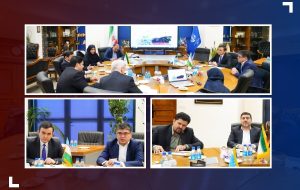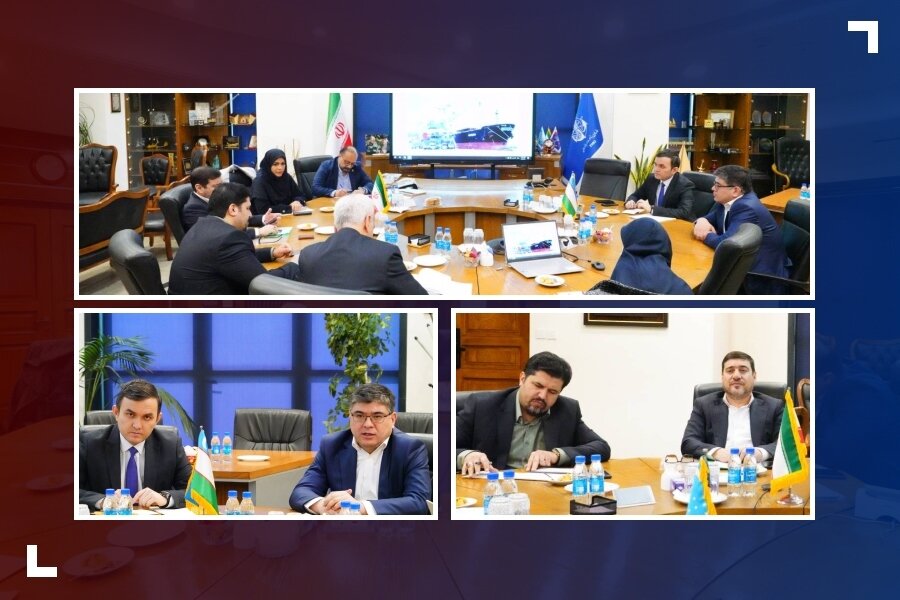Iran, Uzbekistan commit to expanding regional transport, transit cooperation
TEHRAN – The Ambassador of Uzbekistan to Tehran Fariddin Nasriev met with Ali Akbar Safaei, Iran’s deputy Minister of Transport and Urban Development and head of the Ports and Maritime Organization (PMO), to discuss strengthening bilateral and regional transport and transit collaboration. The meeting emphasized facilitating trade between the two nations, the PMO portal reported.


TEHRAN – The Ambassador of Uzbekistan to Tehran Fariddin Nasriev met with Ali Akbar Safaei, Iran’s deputy Minister of Transport and Urban Development and head of the Ports and Maritime Organization (PMO), to discuss strengthening bilateral and regional transport and transit collaboration.
The meeting emphasized facilitating trade between the two nations, the PMO portal reported.
As reported, discussions focused on streamlining multimodal transportation between Iran and Uzbekistan via Iranian ports in the country’s northern and southern regions.
The PMO expressed readiness to swiftly address issues faced by Uzbek traders and businesses along regional corridors passing through Iran. The two sides also discussed organizing reciprocal trade delegations, including visits by Uzbek technical representatives, traders, and transport companies to explore Iran’s port capacities for enhanced transit options within the framework of the International North-South Transit Corridor (INSTC).
Additionally, the meeting highlighted the importance of establishing joint regional corridors to facilitate the smooth movement of Uzbek goods to Russia and India, leveraging Iran’s port infrastructure to achieve the goals set by the presidents of both nations.
In a meeting with a joint delegation from the Ministries of Agriculture, Trade, and Investment of Uzbekistan in Tehran in early December, Iranian Minister of Agriculture Gholamreza Nouri Ghezeljeh stated that Iran is prepared to enhance cooperation with Uzbekistan in sharing agricultural experiences and technology.
Referring to the 14th Iranian government’s strategic vision to enhance relations with other countries, Nouri highlighted the initiative taken by the President of Uzbekistan to foster international relations, which has created significant opportunities for constructive cooperation between the two countries.
He expressed Iran’s readiness to supply the agricultural machinery that Uzbekistan needs, emphasizing that cooperation could involve not only the direct export of products, but also the barter of goods such as potatoes and legumes.
Nouri also pointed out that Iran has a rich history of over a century in agricultural research and is prepared to share its valuable experiences with Uzbekistan.
During the meeting, Ibrohim Ergashev, head of the Plant Quarantine Service of Uzbekistan, stressed the importance of economic cooperation between the two countries, saying, “Uzbekistan is committed to developing and strengthening trade relations with Iran, and necessary planning has been undertaken in this regard.”
On October 20, 2024, an official with Iran’s Trade Promotion Organization (TPO) said that Iran and Uzbekistan plan to increase their annual trade exchanges to $5.0 billion and the two sides have reached a primary agreement to sign a preferential trade agreement (PTA) soon.
Akbar Godari, the head of TPO’s Central Asia, Caucasus, and Russia Office, referred to the economic agreements reached between the two countries during the visit of Uzbekistan’s Minister of Investment, Industry, and Trade to Iran, and said: “The efforts and desire of the two countries to develop trade exchanges have been formed, therefore the 16th Joint Economic Committee meeting of Iran and Uzbekistan will be hosted by Iran in March to increase trade exchanges.”
Also, discussions have been held regarding the details of a joint investment fund between the two countries that will be established shortly, Godari added.
Regarding the initial agreements for the signing of a preferential trade agreement between Iran and Uzbekistan, the official said: “Last year, Abbas Ali-Abadi, the Iranian Minister of Industry, Mining and Trade at the time, traveled to Uzbekistan and discussed with his counterpart in Uzbekistan the conclusion of a preferential trade agreement. For more than six months, the two countries discussed various aspects of the agreement including the certificate of origin document, and reviewed and resolved the challenges ahead, and now preliminary agreements have been made to sign this agreement.”
He underlined the role of the Trade Promotion Organization of Iran in facilitating the trade relations between Iran and Uzbekistan, saying: “The list of the goods that are subject to preferential tariffs has been determined, and the Trade Promotion Organization of Iran is trying to increase the number of items that are subject to preferential tariffs in a short period.”
On September 19, 2024, Uzbekistan capital Tashkent hosted an Iran-Uzbekistan business forum, in which officials and businesspeople from the two sides exchanged views on ways of expanding mutual trade ties, the portal of Iran Chamber of Commerce, Industries, Mines and Agriculture (ICCIMA) reported.
Speaking at the forum, ICCIMA Head Samad Hassanzadeh called for more enhanced exchanges between Iran and Uzbekistan.
Hassanzadeh, who visited Uzbekistan on top of a business delegation, underlined the development of new strategies to strengthen economic relations as one of the goals of the business forum and emphasized the need to take serious steps in this regard from both sides.
“I would like to stress that in the new atmosphere of cooperation between the two countries, it is necessary to take serious steps to expand relations. Taking advantage of existing potential capacities and opportunities can guarantee long-term economic relations between the economic operators of Iran and Uzbekistan,” the ICCIMA head said.
Emphasizing the cultural affinities and friendship between the two nations and the interest for cooperation between the two nations and the two governments, he continued: “As in recent years, there have been three visits at the presidential levels between the two countries.”
“Currently, the establishment of the new government in Iran with the slogan of removing obstacles to foreign trade promises a new chapter in Iran’s economic cooperation, especially with regional countries,” the official added.
Elsewhere in his remarks, Hassanzadeh noted that achieving economic goals between the two countries requires providing the necessary infrastructure including banking and monetary, transportation, development of customs, adjustment of trade tariffs, and exchange of technical knowledge.
“Currently, our primary goal for this year is to increase our current $500 million trades to $1.0 billion, and we hope to achieve this by the end of the year,” he said, adding that “Countless economic capacities are available for the economic operators of the two countries, and this enthusiasm that is seen today for the cooperation of companies, needs to be taken very seriously by the policy makers and authorities of the two countries.”
EF/MA
